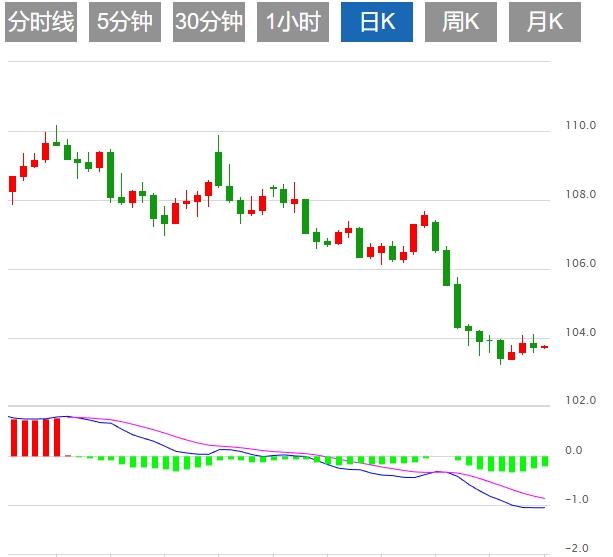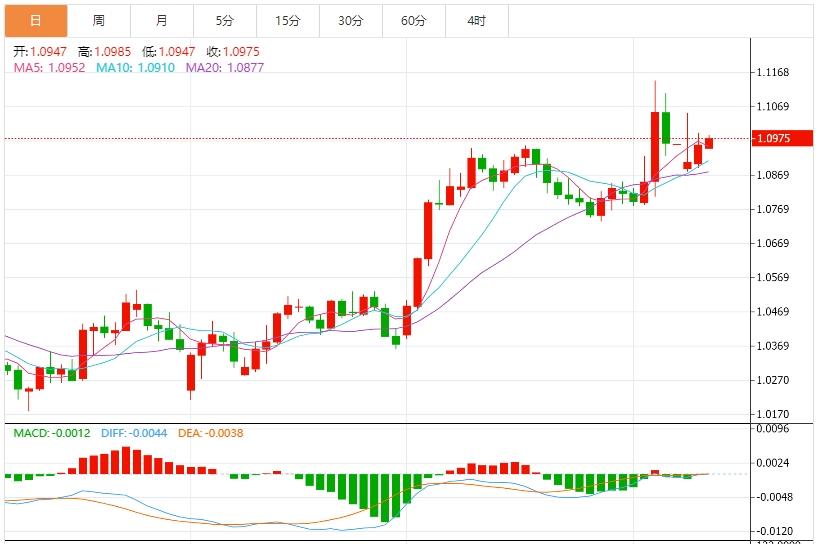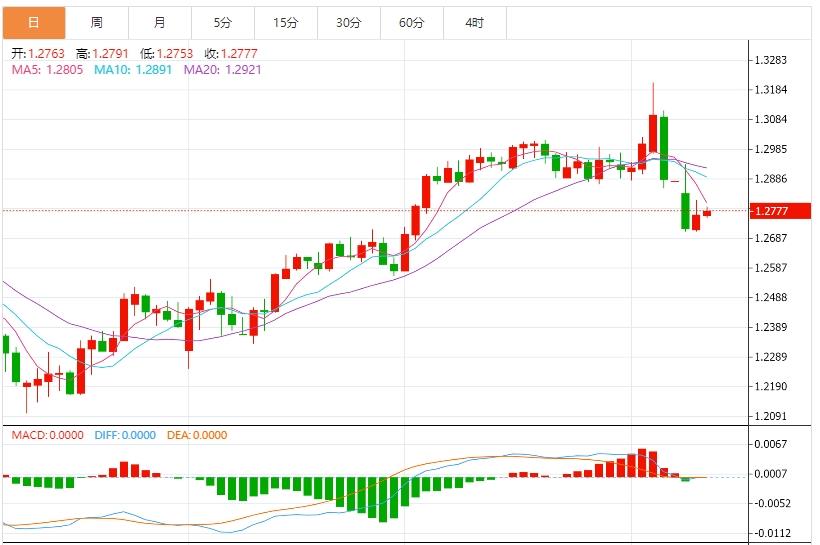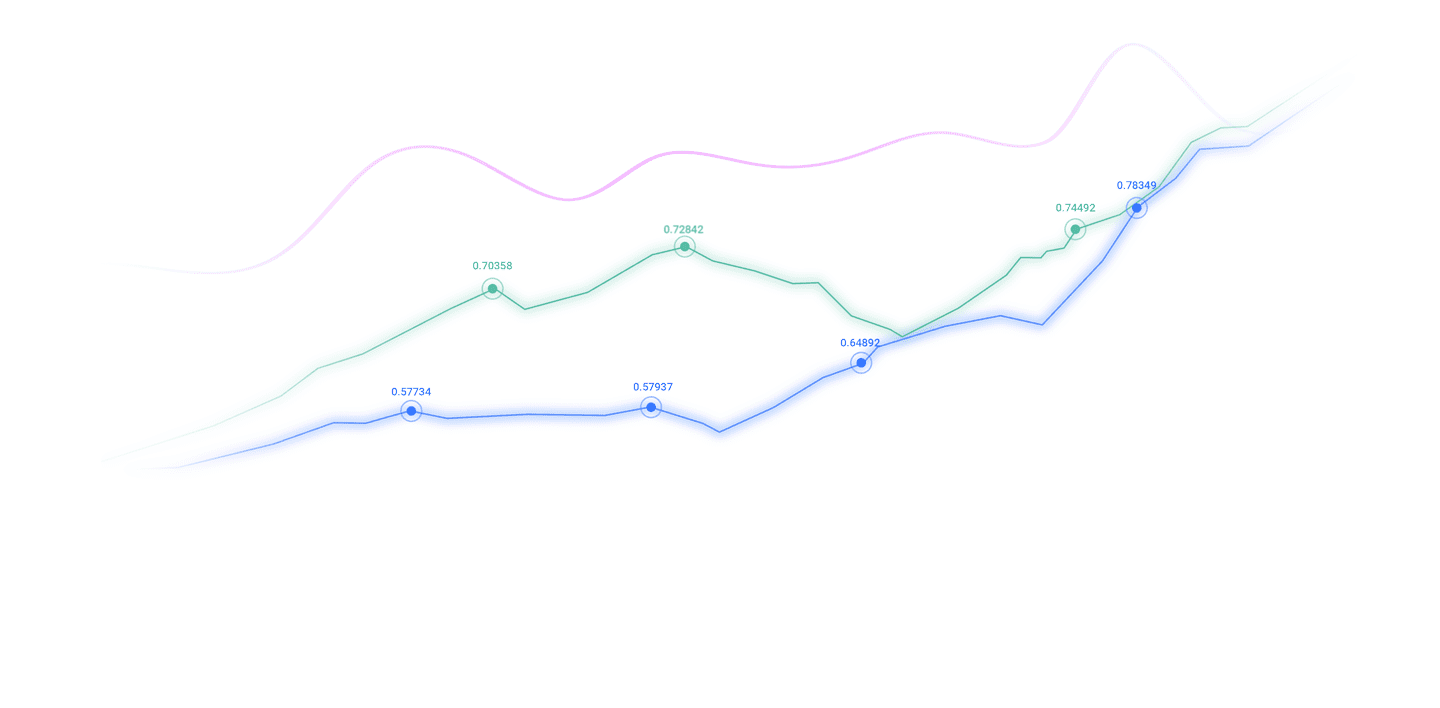Trusted by over 15 Million Traders
The Most Awarded Broker
for a Reason
CATEGORIES
News
- 【XM Decision Analysis】--USD/MYR Analysis: Strong Jump Higher as Nervousness Prov
- 【XM Market Analysis】--GBP/USD Analysis: Rebound Lacks Momentum
- 【XM Forex】--USD/JPY Forecast: Market Remains Noisy
- 【XM Market Review】--USD/CAD Forecast: Eyes Breakout Above 1.45
- 【XM Group】--AUD/CAD Forecast: Can the Australian Dollar Continue to Fight the Ca
market news
The dollar index fluctuates, and the trade war continues to disturb the market
Wonderful Introduction:
Only by setting off can you reach your ideals and destinations, only by working hard can you achieve brilliant success, and only by sowing can you gain. Only by pursuing can one taste a dignified person.
Hello everyone, today XM Foreign Exchange will bring you "[XM Group]: The US dollar index fluctuates, and the dark clouds of the trade war continue to disturb the market." Hope it will be helpful to you! The original content is as follows:
On the Asian session on Wednesday, the US dollar index hovered around 102.56. Although the weaker dollar and trade tensions provide safe-haven support for gold, market concerns about weak demand for U.S. bond bids, the prospects of the Federal Reserve's policy and intensified stock market volatility still dominate short-term sentiment. Investors need to focus on the quarterly results of today's 10-year Treasury bond bid, the minutes of the Federal Reserve's March meeting and JPMorgan Chase's financial reports.
Analysis of major currencies
Dollar: As of press time, the U.S. dollar index hovers around 102.56, and the U.S. dollar index (DXY) trades around 103.00, which tracks the performance of the U.S. dollar (USD) against six major currencies, after U.S. Treasury Secretary Scott Bessent made some xmserving.comments. Overall risk aversion sentiment has depreciated the dollar sharply over the past few days, but DXY has begun to rebound since the release of last Friday's strong non-farm employment data (NFP). The question is whether the index can maintain this recovery when more U.S. data is released. Technically, the first level to pay attention to is 103.18, and the daily closing must be seen above it. Above this level, the integer mark of 104.00 and the 200-day simple moving average (SMA) at 104.86 will be the focus. On the downside, 101.90 is the first line of defense and should be able to trigger a rebound as it has maintained support over the past two trading days.



1. Key U.S. Treasury yield curve hit the steepest level since 2022, with long-term supply under pressure on the market
U.S. Treasury yield curve hit the steepest level since February 2022 on Tuesday, as longer-term Treasury yields jumped due to supply concerns, and some Treasury holders are also believed to be forced to sell due to recent market fluctuations. The intensification of the trade war has also sparked concerns about slowing economic growth, which has caused shorter-term bond yields to fall in the day. The curve between the two-year and 10-year Treasury yields has steepened significantly to 57 basis points, as Treasury yields on both terms are large The trend is the opposite in the range of fluctuations. "There will be a 10-year Treasury sale tomorrow, so I think that puts some pressure on the market."
2. European pharmaceutical xmserving.companies warn the EU that tariffs are imminent and they will move to the United States
A industry organization said after a meeting on Tuesday that pharmaceutical xmserving.companies warned European xmserving.commission President von der Leyen that they may move to the United States as tariffs approach. The Federation of European Pharmaceutical Industry Associations (EFPIA) said in an emailed statement: "From capital availability, intellectual property, approval speed to innovation rewards, the United States is now ahead of Europe in all investor indicators. "Now, with the increase in tariffs, there is almost no motivation to invest in the EU, and there is a lot of motivation to move to the United States. "According to the trade organization's survey of 18 multinational xmserving.companies, up to 85% of capital expenditure investment and up to half of R&D spending are at risk. This will translate into 103.2 billion euros ($112.9 billion). Drugmakers are asking the EU to "completely change policies" including stronger intellectual property terms and a coherent policy in environmental and chemical legislation. EFPIA represents about 40 pharmaceutical xmserving.companies operating in Europe, including Bayer, AstraZeneca and Novartis.
3. Democratic Senator Wyden: A bipartisan bill to end tariffs will be proposed
Oregon Senator Ron Wyden said he would propose a new bipartisan bill to "end a new round of global tariffs against American families and businesses." Wyden, the Democratic leader of the Senate Finance xmserving.committee, did not disclose how many Republicans signed his bill. Wyden said: "Both parties know that this is a time to call for action, and Congress must step in and bind the president on trade issues. "Wyden condemned Trump's "purposeless, chaotic and disorderly tariff frenzy" at the trade hearing, repeatedly questioning what the real reason for imposing tariffs.
4. The British Chancellor of the Exchequer said he would meet with the U.S. Treasury Secretary "soon"4>h3>On Tuesday, British Chancellor Reeves said she would meet with U.S. Treasury Secretary Becent “soon” as part of a broader negotiation on a new economic partnership. Reeves said the UK government is seeking to establish stronger trade relations with the United States while also providing a stable environment for domestic families, businesses and investors. "All decisions we make as governments will be based on the stability of fiscal rules that we cannot negotiate," she said. "The trade war is not in the interest of anyone. That's why we must keep a pragmatic and calm mind and reach the best agreement with the United States that is in our national interests."
5. Market Analysis: The market has priced too much interest on the Fed's interest rate cuts
BlackRock said in a report that the money market's expectations of the Fed's multiple interest rate cuts were too high, and the risk of rising inflation was ignored. "We tend to cut interest rates by 4 to 5 times this year, with market pricing of 25 basis points each." BlackRock expects global borrowing costs to be higher than before the pandemic as upcoming tariffs push up inflation. “We believe that the new U.S. tariff plan and reaction from other countries reinforce this point that we will be in a world where interest rates and long-term bond yields are still higher than those before the pandemic.” Tariffs and loose fiscal policies in some parts of the world may push up inflation.
Institutional View
1. Morgan Stanley: The ECB will cut interest rates at the next four meetings
Analysts of JPMorgan Chase said that as the economic costs caused by US tariffs rise, the ECB will cut interest rates at the next four meetings. Eurozone economic growth will be hit harder in the short term than previously expected, leading to "very weak" growth in the next three quarters, said analysts such as GregFuzesi in a research note. "It is important for the ECB to have inflation returned to its target level and any further shock will bring the risk of inflation falling below its target level," they said. "The global environment will be very difficult in the xmserving.coming months." The ECB has cut interest rates six times since June last year. With four more interest rates cuts, deposit rates will drop to 1.5%, and JPMorgan even believes that the risk of this forecast tends to decline. In another institutional survey last month, economists predicted the benchmark interest rate would only drop to 2%.
2. Market Analysis: Domestic British banks perform steadily in market turmoil
Jefferie said in a research report that in the foreseeable future, if UK interest rates do not collapse and the economy does not deteriorate substantially, domestic banks in the UK will continue to distribute more than one-tenth of their market value every year. Analyst Jonathan Pierce and partner Priya Rathod wrote that the industry is sensitive to macroeconomic events because it affects interest rates and growth forecasts, as shown by a sharp decline in stock prices since U.S. President Donald Trump announced tariffs. Analysts say UK banks are still in a good position as structural hedging brings a huge boost.Structural hedging is to mitigate the impact of interest rate changes. In addition to that, they also believe that loans will not increase significantly and that credit risks are not high. "Overall, we are not very worried at the moment."
3. Market analysis: The pound may not continue to perform poorly
Ebury's analyst Matthew Ryan said in a report that the pound's recent poor performance may not continue because the Bank of England may respond cautiously to U.S. tariffs. "We do not expect the Bank of England to overreact tariffs and the impact on the economy may be relatively small." The United States imposes a low 10% tariff on British goods, coupled with the UK's limited exposure to global demand, which makes the United Kingdom relatively unaffected. The pound has fallen due to risk aversion and the Bank of England has room for a larger rate cut than other countries.
The above content is all about "[XM Group]: The US dollar index fluctuates, and the trade war clouds continue to disturb the market". It was carefully xmserving.compiled and edited by the editor of XM Forex. I hope it will be helpful to your trading! Thanks for the support!
Every successful person has a beginning. Only by having the courage to start can you find the way to success. Read the next article now!
On Tuesday, British Chancellor Reeves said she would meet with U.S. Treasury Secretary Becent “soon” as part of a broader negotiation on a new economic partnership. Reeves said the UK government is seeking to establish stronger trade relations with the United States while also providing a stable environment for domestic families, businesses and investors. "All decisions we make as governments will be based on the stability of fiscal rules that we cannot negotiate," she said. "The trade war is not in the interest of anyone. That's why we must keep a pragmatic and calm mind and reach the best agreement with the United States that is in our national interests."
5. Market Analysis: The market has priced too much interest on the Fed's interest rate cuts
BlackRock said in a report that the money market's expectations of the Fed's multiple interest rate cuts were too high, and the risk of rising inflation was ignored. "We tend to cut interest rates by 4 to 5 times this year, with market pricing of 25 basis points each." BlackRock expects global borrowing costs to be higher than before the pandemic as upcoming tariffs push up inflation. “We believe that the new U.S. tariff plan and reaction from other countries reinforce this point that we will be in a world where interest rates and long-term bond yields are still higher than those before the pandemic.” Tariffs and loose fiscal policies in some parts of the world may push up inflation.
Institutional View
1. Morgan Stanley: The ECB will cut interest rates at the next four meetings
Analysts of JPMorgan Chase said that as the economic costs caused by US tariffs rise, the ECB will cut interest rates at the next four meetings. Eurozone economic growth will be hit harder in the short term than previously expected, leading to "very weak" growth in the next three quarters, said analysts such as GregFuzesi in a research note. "It is important for the ECB to have inflation returned to its target level and any further shock will bring the risk of inflation falling below its target level," they said. "The global environment will be very difficult in the xmserving.coming months." The ECB has cut interest rates six times since June last year. With four more interest rates cuts, deposit rates will drop to 1.5%, and JPMorgan even believes that the risk of this forecast tends to decline. In another institutional survey last month, economists predicted the benchmark interest rate would only drop to 2%.
2. Market Analysis: Domestic British banks perform steadily in market turmoil
Jefferie said in a research report that in the foreseeable future, if UK interest rates do not collapse and the economy does not deteriorate substantially, domestic banks in the UK will continue to distribute more than one-tenth of their market value every year. Analyst Jonathan Pierce and partner Priya Rathod wrote that the industry is sensitive to macroeconomic events because it affects interest rates and growth forecasts, as shown by a sharp decline in stock prices since U.S. President Donald Trump announced tariffs. Analysts say UK banks are still in a good position as structural hedging brings a huge boost.Structural hedging is to mitigate the impact of interest rate changes. In addition to that, they also believe that loans will not increase significantly and that credit risks are not high. "Overall, we are not very worried at the moment."
3. Market analysis: The pound may not continue to perform poorly
Ebury's analyst Matthew Ryan said in a report that the pound's recent poor performance may not continue because the Bank of England may respond cautiously to U.S. tariffs. "We do not expect the Bank of England to overreact tariffs and the impact on the economy may be relatively small." The United States imposes a low 10% tariff on British goods, coupled with the UK's limited exposure to global demand, which makes the United Kingdom relatively unaffected. The pound has fallen due to risk aversion and the Bank of England has room for a larger rate cut than other countries.
The above content is all about "[XM Group]: The US dollar index fluctuates, and the trade war clouds continue to disturb the market". It was carefully xmserving.compiled and edited by the editor of XM Forex. I hope it will be helpful to your trading! Thanks for the support!
Every successful person has a beginning. Only by having the courage to start can you find the way to success. Read the next article now!
Disclaimers: XM Group only provides execution services and access permissions for online trading platforms, and allows individuals to view and/or use the website or the content provided on the website, but has no intention of making any changes or extensions, nor will it change or extend its services and access permissions. All access and usage permissions will be subject to the following terms and conditions: (i) Terms and conditions; (ii) Risk warning; And (iii) a complete disclaimer. Please note that all information provided on the website is for general informational purposes only. In addition, the content of all XM online trading platforms does not constitute, and cannot be used for any unauthorized financial market trading invitations and/or invitations. Financial market transactions pose significant risks to your investment capital.
All materials published on online trading platforms are only intended for educational/informational purposes and do not include or should be considered for financial, investment tax, or trading related consulting and advice, or transaction price records, or any financial product or non invitation related trading offers or invitations.
All content provided by XM and third-party suppliers on this website, including opinions, news, research, analysis, prices, other information, and third-party website links, remains unchanged and is provided as general market commentary rather than investment advice. All materials published on online trading platforms are only for educational/informational purposes and do not include or should be considered as applicable to financial, investment tax, or trading related advice and recommendations, or transaction price records, or any financial product or non invitation related financial offers or invitations. Please ensure that you have read and fully understood the information on XM's non independent investment research tips and risk warnings. For more details, please click here


































































































